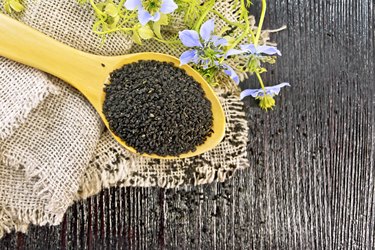
What's black, comes in seed form and has been touted for thousands of years as a treatment for all manner of heart, respiratory, digestive, kidney and liver problems? A prosaically named herb called black seed or black cumin. But what medical properties does it really possess?
Read more: Side Effects of Black Seed
Video of the Day
Video of the Day
Black Seed Explained
According to a clinical trial review published in the September 2017 issue of the Journal of Pharmacopuncture, black seed (or Nigella sativa) belongs to the Ranunculacea family of herbs. Its principal ingredient — and the purported source of its power — is thymoquinone. Its seeds and oils have been the legendary stuff of folklore, taking pride of place in traditional and alternative medicinal treatments dating back 2,000 years or more.
"Black seed can come from cumin, caraway and a variety of other plants," says Connie Diekman, MEd, RD, a food and nutrition consultant in St. Louis, past president of the Academy of Nutrition and Dietetics and author of The Everything Mediterranean Diet Book. "And it, like so many other herbs and plants, was commonly used in ancient medicine as populations saw benefit from its use."
For example, the Journal of Pharmacopuncture review points out that, in India and the Middle East, black seed has been used for centuries to help boost the immune system and promote a general sense of well-being, as well as being used to treat any number of disorders and conditions.
After looking at the findings of a more than a dozen clinical trials conducted prior to 2016, it concludes that black seed can have a positive impact on a range of different health concerns, including infertility, heart disease, nervous system illness, skin disease, infections, asthma and gastrointestinal illness, among others. One trial even suggested it could be helpful in improving the survival rate of children battling the blood cancer leukemia. Also, as a whole, side effects are deemed to be negligible.
As far as weight loss is concerned, the review notes that some randomized controlled trials do indicate that, when black seed is incorporated as part of a low-calorie diet, it can be helpful in promoting weight loss among people with obesity. One trial specifically indicated that consuming just 3 grams of black seeds a day for three months helped men with obesity achieve a very significant reduction in body weight.
The Need for More Research
Still, not everyone is entirely on board with the medicinal power of black seed.
The Memorial Sloan Kettering Cancer Center, for one, acknowledges that some animal and early-stage research indicates that black seed might have some anti-inflammatory and antioxidant properties, as well as some potential in helping to control blood pressure, diabetes, rheumatoid arthritis and asthma. But Sloan Kettering warns that there are no human studies definitively demonstrating its potential as a treatment for cancer.
Diekman's hesitation is even broader. "Now that science can study and research herbs and plants, the answer to their benefits is less clear," she says.
"While some research does show some benefits of black seed in asthma, diabetes, hypertension and other diseases, most of the research is either done in animals or in very small human populations. So, more research is needed. And the research thus far just does not support regular use of black seed, or its use in place of known medical treatment."
That opinion is seconded by Lona Sandon, PhD, RDN, program director and associate professor in the department of clinical nutrition at the School of Health Professions at University of Texas Southwestern Medical Center at Dallas. "The research is pretty limited," Sandon warns, adding that most of the science to date has been conducted with rats and in a lab cell culture setting, neither of which necessarily translates to real life experience.
She suggests that anyone truly interested in trying to address the serious health issues associated with having overweight or obesity, such as blood pressure control, diabetes or asthma, should turn to more evidence-backed interventions, including increasing physical activity and maintaining a balanced diet.
Read more: A Possible Downside to Herbal Supplements
- Connie Diekman, MEd, RD, food and nutrition consultant, St. Louis; past president, Academy of Nutrition and Dietetics; author, The Everything Mediterranean Diet Book
- Lona Sandon, PhD, RDN, LD, program director, associate professor, department of clinical nutrition, School of Health Professions, University of Texas Southwestern Medical Center, Dallas
- Journal of Pharmacopuncture: "Review on Clinical Trials of Black Seed (Nigella sativa) and Its Active Constituent, Thymoquinone"
- Memorial Sloan Kettering Cancer Center: "Nigella Sativa"